Building the Will to End Factory Farming




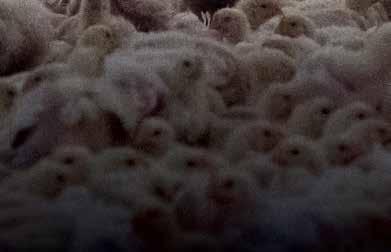
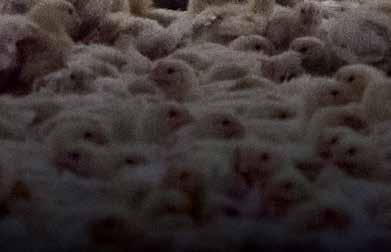

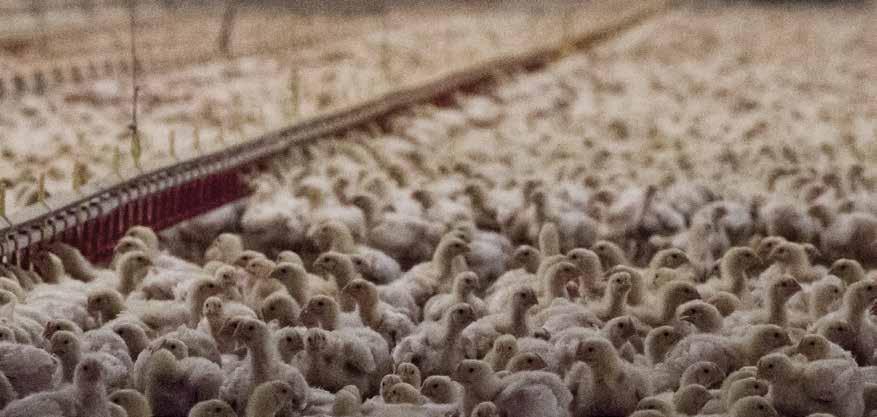










Accountability has proven key to the success of every justice movement creating systemic change. In the landmark year of 2022 Farm Forward stepped up our work to hold producers, retailers and labels accountable to the basic values most Americans share about the food they purchase.
In April, our anti-humanewashing campaign made national headlines with the publication of our major investigation into antibiotic and other drug residues in animal products marketed as “raised without antibiotics.” In August, our testing data was used in a class action lawsuit alleging that a major natural food retailer is deceiving the public by marketing meat as “raised without antibiotics.”
In November we released our second annual survey of consumer beliefs, confirming that what shoppers believe is wildly out of sync with the reality of farmed animals’ lives—even when it comes to the most trusted labels and retailers. I gave twenty TV and radio interviews about our survey results, appearing on Fox and ABC, and in the New York Post.

As Farm Forward has gone public with our accountability work, allies have asked me why we don’t just focus on the worst-of-the-worst companies, and why we would focus attention on the companies that market themselves as “better” alternatives. The answer is simple—we do this because, over and over, American consumers tell us that they expect better from the meat industry than what labels and regulators currently require. Dozens of consumer surveys, including our own, show that Americans overwhelmingly oppose factory farming, and are willing to find and pay for animal products from farms that raise animals under more humane conditions. So shouldn’t we as farmed animal advocates at the very least demand what consumers expect?
And, personally, I do this because to get up every day and fight for farmed animals, I need to have hope in the possibility of systemic change, change that points to the end of factory farming. Getting there starts with telling the truth.
Onward and forward,
Andrew deCoriolis Executive Director
When I look at the history and successes of the movement to end factory farming, I’m encouraged by the progress we are seeing both in public attitudes and in tangible policies.










35+ Villages in India received free and subsidized veterinary care and animal welfare education through Farm Forward’s grants in 2022, improving the lives of hundreds of farmers and thousands of animals.
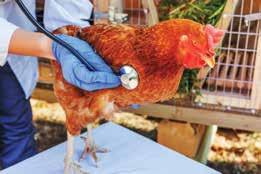
90+ institutions, including Harvard Business School, Bon Appetit Management Company, and New York City Public Hospitals, have transformed their dining operations to serve more plant-based foods and/or fewer factory farmed products through Farm Forward’s in-house and partner programs, including the Leadership Circle, the Better Food Foundation’s default veg initiative, and Greener by Default.

1,700+ individuals were reached by 12 educational presentations to faith-based communities in 2022, led by Farm Forward's Jewish Initiative for Animals (JIFA) alone and in collaboration with multi-faith outreach partners.



856M+
20K+ PEOPLE OBALLY





$1.1B+ IN FOOD SPEND ANNUALLY


Safran Foer and other speakers since they began in 2012.
humanewashing, antibiotics, USDA standards, consumer deception, and animal welfare labels took place in 2022.

56M+ people globally in 2022 re reached by media stories eaturing Farm ard’s work, building unprecedented public awareness about humanewashing, the role of industrial animal agriculture in pandemics, and farmed animal welfare.



$B if d d
$1.1B+ in food spend is annually impacted by the Good Food Purchasing Program, in 20 cities and counties, with 60 school districts, municipalities, and other large institutions enrolled across the United States; Farm Forward led the coalition that developed GFPP’s animal welfare and meat reduction standards Version 3.0, to be released in early 2023.


Farm Forward generated unprecedented media coverage in 2022 on topics including pandemics, humanewashing, and the cattle industry’s contribution to drought. In February, the New York Times published our Letter to the Editor responding to their video series on the modern poultry industry. Our letter marked the first time the New York Times published the term humanewashing in its 170-year history. The following week, the New York Times quoted our Executive Director, Andrew deCoriolis, in its article about avian flu.

Farm Forward’s reports, videos, and ad campaigns led to many media outlets covering the topic of humanewashing for the first time in national print and TV news. Dozens of news outlets directly covered our antibiotics investigation and related lawsuit, including Forbes, National Public Radio, Fox Business, CBS, ABC, The Kitchn, the Washington Times, and Food & Wine magazine. The lawsuit news was also picked up by the Reuters wire service and republished in 300+ outlets, including U.S. News, Apple News, and Yahoo News, as well as insider meat industry and legal media like Meat & Poultry magazine, Food Safety News, MeatingPlace magazine, topclassactions.com, Law360, and JDSupra.com. The story’s total global reach was conservatively estimated at around 500 million people.



In November Andrew conducted a national media tour, and was featured in 20 TV and radio interviews generating 1,892 stories both broadcast and online across the country.
Andrew warned the public about the ongoing threat of humanewashing and bird flu, raised awareness of the growing trend to serve more plant-based foods for the holidays, and explained how consumers are being deceived by welfare labels, as revealed in Farm Forward’s consumer surveys.


In 2022 the Jewish Initiative for Animals published four Op-Eds and its campaign about humanewashing in kosher industries was featured in Jewish and mainstream media. The news coverage focused on the humanewashing campaign (which has been supported by 250 leading rabbis), JIFA’s research revealing the faulty consumer perception that kosher is better for animals, as well as JIFA’s drug testing research that included positive results for drug residue in chicken products from the largest kosher poultry producer, Empire Kosher.
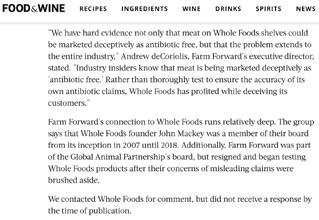
20 INTERVIEWS GENERATING
1,892 STORIES
“Kosher does not always mean better, especially for animals and meat”
“Kosher is going mainstream; food safety an important issue”

“Another New Year, Another Drought: Time to Reflect”



In April, we released results of our year-long investigation that tested chicken and cow products (including meat from Whole Foods Market certified as having “no antibiotics, ever”) for antibiotic residues. Among our positive drug results, in a product labeled ”Animal Welfare Certified by Global Animal Partnership,” “Organic,” and “antibiotic free,” we found residue of an antibiotic, monensin, that is typically used as a growth-promoter in cattle. Antibiotics and other drugs are used widely on factory farms to keep animals alive in cruel and filthy conditions that might otherwise kill them.
Our antibiotics findings were bolstered by a peer-reviewed study published in Science which presents empirical evidence that a significant percentage of cattle —up to 22 percent—within the Global Animal Partnership’s Animal Welfare Certified™ program, which is used by Whole Foods, have come from feedyards where testing suggests antibiotics were administered routinely. In other words, these were not isolated incidents affecting only individual animals but entire herds.

“I believe in the power of conscientious individuals— shoppers, farmers, and voters—to change our food system. But our power is under attack, and we must defend it.”BEN GOLDSMITH, CHIEF STRATEGIST AND CO-FOUNDER, FARM FORWARD
In 2022 Farm Forward’s Humanewashing Campaign raised awareness of humanewashing as a corporate deception tactic akin to greenwashing, leading to increased the use of the term humanewashing by U.S. media and nonprofits.
In keeping with our concerns about GAP and Whole Foods falling short of consumers’ expectations about animal welfare, their failure to prevent the misuse of antibiotics within their supply chain calls into question their ability to make guarantees about animal welfare. Whole Foods continues to use labels like GAP’s Animal Welfare Certified™ to humanewash, obscuring the truth that the vast majority of products on their shelves come from factory farms.
In 2021, we brought together a coalition of public health, animal, and environmental groups to challenge the highly-deceptive new certification scheme, One Health Certified. In 2022, that coalition engaged the USDA Food Safety Inspection Service to urge the agency to create new guidelines for meat labeled with claims like “humanely raised” and “antibiotic free.” This new collaboration between animal and public health advocacy groups opens many possibilities for strengthening our collective work in the policy sector.


“Factory farms use antibiotics and other drugs extensively to ‘manage’ infectious diseases and parasites in crowded conditions. The conditions under which animals are raised in factory farms make them easy breeding grounds for antimicrobial resistance and even future pandemics.”
JIM KEEN, DVM, FARM FORWARD ADVISOR AND VETERINARY INFECTIOUS DISEASE EPIDEMIOLOGISTPhoto by Andrew Skowron / We Animals Media Photo by Nikki Ritcher / We Animals Media
In August, our research findings were included in a consumer class action lawsuit against Whole Foods, which Farm Forward joined as a co-plaintiff.LETTER FROM THE EXECUTIVE DIRECTOR OF JIFA
Genesis, the first book in the Bible, gives humans and all the other animals the same commandments to be fruitful and multiply and to eat only plants. The one thing that distinguishes humans from other animals is that humans are made in God’s image and, as a result, they have dominion over the other animals. How we act toward the other animals with whom we share this world reflects to what extent we live up to the divine spark we have been gifted.
At Jewish Initiative For Animals (JIFA) our goal is to help promote animal welfare and ethical consumption so that the divine within us can shine outside of us. We do this by helping align the Jewish community’s food choices with our tradition’s values.



We continue to find ways to challenge people’s assumptions about kosher, revealing Empire Kosher Poultry’s links to factory farms’ abysmal animal welfare practices and unregulated drug and antibiotic use. By raising awareness about the relationship between water usage restriction in Los Angeles and industrial agriculture, we highlighted the connection between our diets and the ongoing southwestern drought.
As we seek to do more, we have also added to our staff. Having served as a pulpit rabbi for 25 years, this year I was thrilled to join the JIFA team as the Executive Director.
Ellie Fajer joined as our Food Policy Intern, and has been instrumental in supporting our campaigns and working directly with Hillels on improving their food practices, including her own at Stanford University.

Melissa Hoffman continues her excellent work as our Director of Programs, developing new initiatives and campaigns while keeping us focused on our core mission. She has been an invaluable partner.
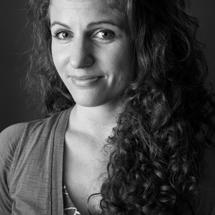
In addition, we had our first 2 synagogues sign up to go DefaultVeg, and submitted a resolution to the Rabbinical Assembly (the union of Conservative Rabbis representing over 1,500 rabbis) calling them to evaluate factory farms, to address the “gulf between industrial food supply practices and our ethics and expectations of a kosher certification.” (That resolution passed overwhelmingly and the committee is already formulating a series of recommendations.)
This past year’s work and growth leaves us excited for the year to come. At its core, the Torah is a call to responsibility that echoes throughout Jewish tradition. Through JIFA’s advocacy for institutional change, we fight to create a more caring and just society for people and the animals in our care.

With gratitude,
Jonathan Bernhard, Rabbi Executive Director, Jewish Initiative for AnimalsFarm Forward is proud to be supported by Dr. Bronners, a company that not only makes grants to anti-factory-farming groups like Farm Forward, but also lives out our values in their business practices, from what they serve in their cafeteria to how they source products ethically in their supply chains.
Tony Adams
Mark J Ahmadi
Susan Allen
Alan & Sharon Altschul
Donna Alvah
Emily Anderson
Ryan Andrews
Vera Armstrong
Elisabeth Arnold
Margaret Atwood
Bruce W. Baber
Benjamin Barer
Marilyn Battin
Anne Bedard
Molly Belkin
Bellroy
Julia & Eric Berger
Louis Aryeh Bernstein
Alison Bjerke
Pelia Blando
Alison L Wiener Blumberg
Kathryn Bositis
John Bossert
Jen Boulden
Joseph Boyd
Eleanor Boyle
Jan Bowman
Don Bradford
Nathan Brasfield
The Bread and Torah Project
Rick Brenner
Alicia Brito
Richard L. Brody
Dr. Bronner’s

Betty Brooks
Anne Brown
Catherine Brown
Suzin Bucci, in honor of Rebecca Canright
Charla B. Buerkle
The Builders Initiative
Gil Buller
Jessie Bunning
Melanie Burger
Mary Burns, D.V.M.
David Butler
Elizabeth Butler
Silvia Cabal
Rebecca Canright
Debra Cantrell
Bonnie Carlson
Patricia Carlton
Liza Carter
Sugreev Chawla
Imm Kim Chee
Ginnie Chen
Michael Cherry
Kelly Christensen
Geoffrey Claussen
Annie Cobb
John Commerford
Charles Copeland
Holly C. Corn
Seldy Cramer
Lisa Crawford
Rhonda P. Cushwa
Sam & Jason Cutler
Cathy M Delia
Tani Demain
Tracey Depres
Curtis Devito
Josh Disker
Evelyn Dickson
Anita Dietrich
Kara DiOrio
Kate Ditzler
Maya Druckmann
Barbara Duno
Diana Durkes
James Edgerton
Jennifer Egan
Harriett D Emerson
Michelle & Glenn
Engelmann Family
Arden Epstein
Stephen Erickson
Dorothy Erlandson
European Unitarian Universalists
Susan Evans
Reid Ewing
Chet Fagin
Bonnie Faigeles
Adam Feild and Erik Torkells
Katy Fendrich-Turner
Jennifer Fine
Beth Finger
Kristen Fletcher
Deirdre Flynn
Jonathan Safran Foer
Cindy Fountain
Deborah Frame
Mary H. Franklin
Ada Frenock
Jonathan Franzen
Kathy Freston
Christopher Fry
Aubrey Gallegos
John Gavin
Kathleen Gerard
Lauren Gersh
Julia Getzelman, in memory of Julie Ann Strudlowski
Peter Gillham’s Natural Vitality
Lori Gleason
Stephen Goldsmith
Cindy Gordon
Mel Gottlieb
Ali Gray
B Gutierrez
Emily Hakkinen
James W. Hall
Diane E. Halverson
Jonathan Harrison

Yasmine Hassan
Abraham Havivi
Stephen R. Hawkins
Kathryn Head
Chris Henry
We are thankful to our many donors who have supported us this year and since we began this work 15 years ago. You are helping us hold fast to our vision and bring it a step closer to reality.
Laura Hepler
Jo Ann Herbert
Leslie Herbst
Roger Higginson
Jennifer Hillyard
Susana & Michael Hoffman
Marilyn Hollander
Sandra Howe
Sean Hoyer
Leah Ilan
Sarah Innocenzi
Alice Jena
JEWISHColorado
Jewish Community Foundation of Central Pennsylvania
Bruce E Johnson
Linda Johnson
Samantha A Johnson
Sharon S. Katz
Jonathan D. Kaufelt
G. D. Kelen
Victoria King
Barrie Newberger King
Rita Kingdon
Sabrina Kirkland
Adin Kobin-Brody
Ryan Koch
Elizabeth Kolbert
Janet Kolodner
Filip Koroy
Amy Kranzler
Scott Kravitz
Irwin Krieger
Dian Krueger
Kummel Family Fund
LeAnn Kurtz
Kate Lacouture
Roni Lagin
Alison Lake
Lynette LaRoche
Michaela Ledesma
Jonathan S. Leo
Judah Levenson
Camila Linardi
Sandra Lucas
DeAnne Luck

Bari Lyman
Courtney MacCormack
Deborah Machalow
Tatiana Mandel
Debbie Mansfield
Nicole Marquis
Melanie Marshall
Rory Maruschak
David C. McCann
Lora McKay
Dee Dee McKee
Sara Meddaugh
Betty & Estelle Mednick
Caroline Meline
David Meyer
Michael Mills
Carole Moore
Barbara Mullins
Karen Murphy
Megan Neeno
Neuman Family Foundation
Andi Neuwirth
Carol Newman
Heather Newport
Sharon Olds
Kevin & Linda O’Neill
Trevor Ortman
Tyra Parker
Aviva Miriam Patt
Rachel Perman
Mandy Perveiler
Charles A. Peters
David Phillips
Julie Pinchak
Natalie Portman
Linda E. Powers
Ziva Prince
Melissa Putnam
K Rana
Cathy Rash
Kathy Ray
Kathy Redmond
Kandra A. Richards
Todd Richardson
Deb Rieman
Mariya Rivera
Rachel Roberts
Whitney Robinson
Michael W. Roman
Roman Catholic Diocese of San Diego
Frederick J. Rosenau Foundation
Saul & Debbie Rosenthal
Rita Sabatino
SanDiego350
Amanda Ashton Sager
Kathleen M Schenk
Melissa Scher
Beverly Schieman
Hannah Gosnell Schneider
Andrea Schwartz
Ann Schwarz
Dayna Schwarz
Nadine Scott
David Sedaris
Hayden Seder
Scott Seidewitz
Patricia H. Senft
Candace Seu
Natalie Shahmiri
Lois Shelton
Shane Sigler
Anne Sikora
Andy Slepman
Anne and Tom Smith
Cherida C. Smith
Kathleen Smith
Treasa Smith
John & Timi Sobrato
Ilya Speranza
Dawn Sylvester
Alexis Stewart
Martha Stewart Living
Steven Stone
W. Clement and Jessie V. Stone Foundation
Angela M Stuebben
Sai Shivaji Dhiraj Suri
Dawn Sylvester
Catherine Taylor
Trish Teieger
Amy Telsey
Pamela Thacher
Laura Thomas
Chandra Throckmorton
Matthew Thurmond
Sally Tiller
Richard Timmins
Robert Tommaselli
Reiner Torenbeek
Erik Torkells
Adrienne Traub
Amy Tryon
John Tyson
Thomas Ullmann
Virtual Uplift
Sally Vernon
Claudia Vernon-Sabine
Renee Viola
Craig Volland
Sarah Vowell
Lissa Walter
Maria Warner
Naomi M Weisman
Randall Williams
Sean Wilsey
Hilma Wingard
Leslie Winick
Cathy S. Wiser
Zach Von Wittkamp
Kari Wolff
Kristin Womack
Lois Wye
Shawn Yanklowitz



92% 77,0 82 FOUNDATION CORP OR ATE CONTRIBUTIONS





92%









82 TION ATE CONTRIBUTIONS








1% $6,983 CONSULTING, INTEREST, & IN-KIND DONATIONS
7% $4 4,127 INDIVIDUAL CONTRIBUTIONS
Total Income $628,192


1% $6,983 CONSULTING, INTEREST, & IN-KIND DONATIONS


























7% $4 4,127 INDIVIDUAL CONTRIBUTIONS

2% $13,317 FUNDRAISING
3% $22,69 0 INDIA
2% $13,317 FUNDR AISING




























5% $36,970 P OLICY
3% $22,69 0 INDIA



5% $36,970 P OLICY







$166,342 FAITH IN FOOD






23%




23% $164,919 PUBLIC EDUCATION
9% $66,757 ADMINISTR ATIVE 9% $67,837 MOVEMENT BUILDING





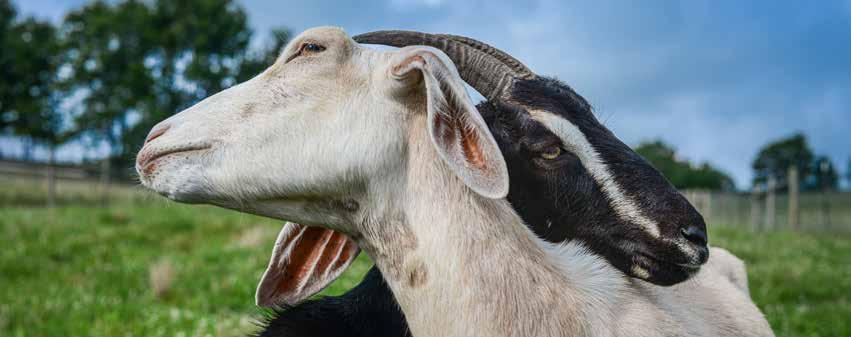
This year I’ve been reflecting on what I can learn from the recent success of the climate movement. Like many of you, I was excited by the passage of the Inflation Reduction Act (IRA), which will radically shift America’s infrastructure toward climate-friendly energy and transportation (though I don’t agree with everything in the IRA, including the bad incentives for biogas).
Two decades ago national legislation like this seemed elusive. But hindsight reveals that advocacy taking place at all levels of society and government paved the way: city councils banned new construction from including fossil gas appliances, universities and businesses adopted climate neutrality targets, and states passed regulations to require renewable electricity generation.

Farm Forward and our partners are pushing for these kinds of changes in our food system right now—and winning. This year the work of the Better Food Foundation and Greener by Default—which grew out of Farm Forward’s Leadership Circle program—helped all of New York City’s public hospitals switch to serving plants-based meals by default to their patients. Our team also helped the city of San Diego adopt its new climate action plan that incentivizes low-carbon, plant-based food for the first time.

The animal welfare and meat reduction standards we helped the Center for Good Food Purchasing develop are being adopted by dozens of cities and states across the U.S. All these outcomes felt elusive to us just five years ago.
It might seem like we face a long road to passing transformative agricultural policy, but it’s critical to remember that this is what progress looked like in the climate movement. Also, as we’ve seen with the IRA, a political moment that enables more radical systemic change can emerge quickly. When we reach that moment in the farmed animal protection movement, how can we ensure that we are ready for it?
We need your support to continue to build momentum. Will you help us as we chart the path toward systemic change?

Let’s build a better future together.
With gratitude,
 Andrew deCoriolis Executive Director
Andrew deCoriolis Executive Director










